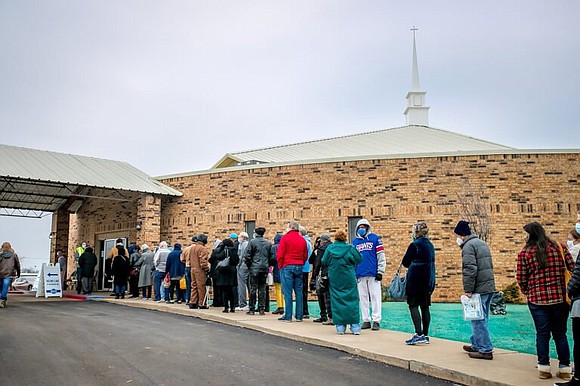Black clergy offer churches as COVID-19 vaccination sites
Adelle M. Banks/Religion News Service | 2/4/2021, 6 p.m.

After more than 1,100 people received the coronavirus vaccine in the fellowship hall of a Black church in Oklahoma City, its pastor credited trust and teamwork for the accomplishment.
Organizers fell just 16 arms short of their goal as Senior Pastor Derrick Scobey, the leader of Ebenezer Baptist Church, worked to make sure they could inoculate as many people as possible in the Black community where his church is located — even when they had some no-shows.
“We plugged in another 40 or so people that did not have appointments,” said Pastor Scobey, who added that he was “ecstatic” about the outcome of the vaccination “pod” at his church hall on Jan. 26.
“We got on the phone, texted and called pastors around the city probably the last hour of the day and just said, ‘If you do have anyone else 65 and older, send me their name and their age and tell them to come now.’ ”
Across the country, Black faith leaders and other clergy of color are engaging in educational forums, videotaping themselves getting vaccinated and offering their church properties for vaccine distribution. Their efforts are underlined by research showing that people of color in the United States have died of COVID-19 at disproportionately higher rates than white Americans.
Pastor Scobey, whose church is affiliated with the National Baptist Convention of America, said the operation at his church came together in a matter of weeks, starting with a text from an executive of Integris Health, an Oklahoma City-based hospital network, and continued with cooperation from the Oklahoma City-County
Health Department. Shots of the Pfizer-BioNTech vaccine were administered in the fellowship hall — after an early morning visit from the governor and the mayor — and the church’s classrooms became temporary offices for the health care workers.
So many people participated that the Church of the Living God next door offered space for the hundred or so volunteers to eat a lunch provided by a local insurance agency.
Efforts similar to the one in Oklahoma City are being offered by a range of religious groups across the country, including a recent joint proposal by leaders of the National Association of Evangelicals and the Orthodox Union, a Jewish organization.
But faith leaders have expressed particular concern about equitable vaccine distribution as Black and Latino Americans have been disproportionally sickened by COVID-19. They also have sought medical experts’ advice in online forums about how to conquer hesitation and fears among their congregants. The specter of the U.S. government’s past medical mistreatment and experimentation on African-American patients, including during the decades-long Tuskegee syphilis study, have played a role in some worshippers expressing doubt about getting the vaccine.
Bishop Adam Jefferson Richardson, the leader of African Methodist Episcopal churches in Florida, said two A.M.E. churches, one in Tallahassee and another in Fort Lauderdale, were vaccination sites on Jan. 10. Between the two, he estimated that more than 1,000 people were vaccinated, the majority of them Black recipients.
A few days before, Bishop Richardson got vaccinated and announced it on Facebook, saying, “The vaccine, I believe, is the answer to prayer. Science and faith met and the world will benefit to mitigate the continued spread of a dangerous, deadly bully — COVID-19.”
Bishop Richardson said he and his wife, a nurse practitioner, hoped publicizing their receipt of the Moderna vaccine would inspire others to take similar action.
“A lot of people in our community, we’re just distrusting of the process, distrusting of the government, distrusting of the vaccine, relating all the way back to Tuskegee; that’s a real matter in our community,” he said. “And the Tuskegee experiment didn’t really come to an end until the early ’70s. It hasn’t been that long ago.”
A week before President Joe Biden took office, U.S. Surgeon General-nominee Vivek Murthy spoke in an online conversation with clergy of color to dispel misinformation about the vaccine and strategize about providing access in harder-to-reach areas, such as communities with many immigrants and places that are “pharmacy deserts.”
Dr. Murthy acknowledged a “deep mistrust that has been sown over time partly as a result of a long standing and deeper racism that many of us have seen in our own lives and experience. It has infiltrated medical research and led to the Tuskegee experiments, which many know, but others as well in the medical system and in the country at large.”
He said it’s time to confront that history and sought faith leaders’ assistance in rebuilding trust.
“Who knows our community more than we do, and who does our community trust more than anyone?” Pastor Scobey said, adding that he is ready to recommend another Black pastor in his area whose church could serve as a future vaccination pod.
“There’s going to be a remnant of pastors that the people trust. Those are the people you have to tap into.”






